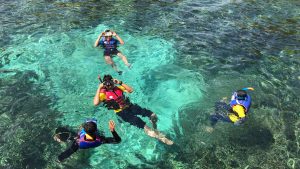The first time you put on a snorkel mask and look beneath the surface at Pulau Macan, it feels like stepping into another world — a world of color, movement, and life. Schools of bright fish shimmer through the reef, corals stretch like underwater gardens, and sunlight dances across the sand. It’s breathtaking, fragile, and alive. But this beauty depends on balance — one careless fin kick, one touch, or one handful of sunscreen can damage an ecosystem that takes centuries to grow. Snorkeling at Pulau Macan isn’t just about enjoying nature; it’s about respecting it. This Responsible Snorkeling Guide will help you explore Pulau Macan’s coral reef safely and responsibly, ensuring your underwater adventure leaves nothing behind but bubbles.
Why Responsible Snorkeling Matters
Coral reefs are the rainforests of the ocean. They host about 25% of all marine life and protect coastlines from erosion. Yet, they are incredibly delicate. Corals are living animals — colonies of tiny polyps that can be destroyed by just a single touch or a careless step. According to NOAA’s National Ocean Service, even a light brush from a fin can break coral tissue and stop growth in that area. Sunscreens containing harmful chemicals like oxybenzone can cause coral bleaching and deformities in marine larvae. These may seem like small actions, but multiplied by thousands of visitors each year, the impact is devastating.
Pulau Macan Eco Lodge was built with one mission: to allow people to experience nature while protecting it. The coral reefs around the island are part of a conservation effort that includes coral planting, waste reduction, and community education. Every snorkeler here plays a role in keeping that balance intact.
Understanding Pulau Macan’s Reef
Pulau Macan is part of the Kepulauan Seribu National Park, a protected marine area north of Jakarta. The reefs here are home to a variety of marine species — butterflyfish, clownfish, parrotfish, and sometimes even small reef sharks or sea turtles. The coral ecosystem thrives because the lodge limits guest numbers, uses eco-friendly boats, and encourages sustainable water activities. Snorkelers can access reefs directly from the beach or by joining guided trips to nearby spots such as Pulau Macan Gundul surrounded by shallow coral gardens perfect for beginners. The waters are calm and clear between June and October, making it ideal for snorkeling with great visibility. During this time, the ocean is teeming with life, and conditions are safe even for families with children.
The Golden Rules of Reef-Safe Snorkeling
Responsible snorkeling starts before you even touch the water. A few mindful habits can protect fragile marine ecosystems and enhance your experience.
- Look, Don’t Touch. The simplest rule of all. Never touch coral, shells, or marine life — even gently. Corals are living animals, and contact can strip away their protective layer or introduce bacteria. Likewise, avoid chasing or cornering fish for photos. You’re a guest in their home; admire them from a distance.
- Keep Your Fins Up. Most coral damage happens accidentally when snorkelers kick the reef. Practice floating horizontally with your fins behind you, not down. Move slowly and use your arms for gentle adjustments rather than rapid kicks.
- Avoid Standing on the Reef. It can be tempting to stand for a quick rest, but even one misplaced foot can crush years of coral growth. Stay afloat instead. If you need a break, float on your back or return to the boat or sandy bottom area.
- Use Reef-Safe Sunscreen. Chemicals like oxybenzone, octinoxate, and avobenzone are toxic to corals. Choose mineral-based sunscreens containing zinc oxide or titanium dioxide. Better yet, wear a long-sleeved rash guard to reduce sunscreen use altogether. Pulau Macan’s gift shop even sells reef-safe sunscreen for guests who forget theirs.
- Leave No Trace. Avoid bringing anything into the sea that doesn’t belong there. That includes plastics, food, or cosmetics. Never feed fish — it disrupts their natural behavior and diet. When you return to shore, rinse your gear properly so you don’t introduce foreign species or contaminants to other sites.
The Gear You’ll Need
Snorkeling is one of the most accessible marine activities — you don’t need much, just the right essentials and a bit of awareness. Bring a mask that fits snugly but doesn’t press too tight, a snorkel with a splash guard to prevent water intake, and fins that are comfortable yet firm enough to help you move smoothly. For kids, choose full-face snorkel masks only if they fit properly and always under adult supervision. Pulau Macan provides rental gear, but frequent snorkelers often prefer bringing their own for hygiene and comfort. Always rinse your equipment in fresh water after use — salt can damage rubber and lenses over time.
Snorkeling Safely With Kids
Pulau Macan is perfect for families, and snorkeling can be one of the most magical activities for children. The key is supervision and pacing. Start in shallow areas near the beach where the seabed is sandy and calm. Let kids practice breathing through the snorkel before they enter deeper water. Life vests or floatation belts can help build confidence. Always stay close enough to guide them — even strong swimmers can panic if a mask floods or they swallow a bit of seawater.
Teach children basic reef etiquette early: no touching, no standing, and no collecting shells. Turning snorkeling into a learning moment can help them develop lasting respect for the ocean. Many families who visit Pulau Macan say this experience becomes their child’s first real environmental lesson.
Guided Snorkeling at Pulau Macan
For beginners, Pulau Macan offers guided snorkeling trips led by the island crew. These local guides know the safest spots and help guests understand coral ecology. They often include short educational talks about reef life, helping snorkelers identify species and understand how reefs regenerate. Guided sessions also help ensure safety during stronger tides or windy days. The crew keeps a close eye on guests and shares tips on improving technique, such as controlling buoyancy or equalizing pressure when diving slightly deeper. Joining these tours not only enhances your experience but directly supports the island’s conservation projects — part of your fee goes toward coral planting and reef restoration.
Coral Planting: From Snorkeler to Reef Guardian
Pulau Macan isn’t just a place to admire corals — it’s a place to help them grow. Guests can participate in coral planting sessions, where small fragments of healthy coral are attached to underwater frames that encourage regrowth. These initiatives have already helped restore damaged areas and create new habitats for fish and invertebrates. Participating in coral planting is a rewarding way to give back to the sea that provides such beauty and peace. Many guests describe it as the highlight of their stay — a moment when travel becomes transformation.
Photography Without Harm
It’s natural to want to capture the underwater beauty, but cameras can easily distract you from your surroundings. If you’re using an underwater camera or GoPro, secure it to your wrist and practice operating it on land before diving in. Avoid leaning or grabbing onto coral to stabilize yourself — let the water carry you.
Remember: the best photos come from patience and distance. The calmer you are, the more marine life you’ll see.
After the Dive: Being a Responsible Traveler
Responsible snorkeling doesn’t end when you get out of the water. Back on land, rinse off using freshwater provided by the lodge to prevent salt buildup and protect your skin. Dispose of waste properly — Pulau Macan manages all waste responsibly, but guests are encouraged to minimize their own impact by using refillable bottles and avoiding single-use plastics.
Sharing your snorkeling experience can also make a difference. Posting about responsible travel and tagging Pulau Macan helps spread awareness to other travelers who may not know the importance of reef protection.
Conclusion
Snorkeling at Pulau Macan is more than just a recreational activity — it’s a chance to witness one of Indonesia’s most beautiful ecosystems up close and to protect it at the same time. With just a few mindful choices, you can ensure that your visit helps preserve the reef for future generations.
So when you dive into Pulau Macan’s crystal-clear water, remember: float gently, touch nothing, and leave only ripples. The reef will thank you — silently, beautifully, and for years to come.
And when you’re ready, take the next step: join Pulau Macan’s coral planting session and become part of the living story of reef restoration.




